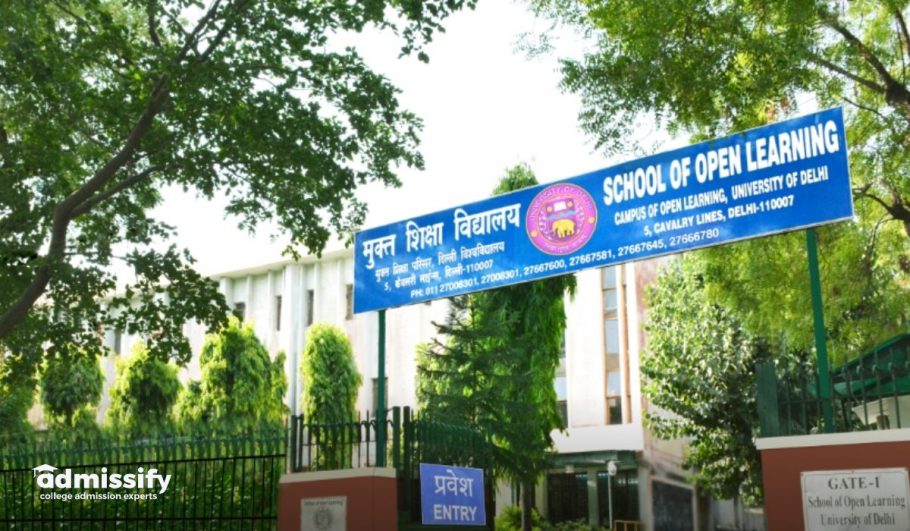Last Updated on December 13, 2024
Welcome to Admissify’s complete guide about Delhi University School of Open Learning (DU SOL) courses for the year 2024! We are your reliable educational companion, and we recognize how crucial it is to make knowledgeable choices regarding your academic path. As a symbol of accessible education, DU SOL provides undergraduate (UG) and postgraduate (PG) programs; here our aim is to illuminate these offerings along with their eligibility criteria and study periods.
In an education world that changes fast, being ahead is very important. This guide we have made can help you understand DU SOL’s many different courses so you know what to expect. If you are a future student wanting to start your first university experience or an experienced worker hoping for more knowledge with postgraduate studies, there is something at DU SOL for everyone.
Thus, come along as we explore the beneficial universe of DU SOL courses, equipping you to pick the ideal selections for your scholastic and career ambitions. Together let us set out on this path towards a brighter future!
What is Delhi University – School of Open Learning?
Delhi University – School of Open Learning, often referred to as DU SOL is a component of Delhi University that gives adaptability in education. It provides remote learning programs where people can learn according to their pace and convenience. Courses of DU SOL are made for different types of students with many undergraduate and postgraduate courses offered. This makes higher education possible for everyone, no matter where they are or how much time they have available.
Why opt for DU SOL Courses?
Usually, students select DU SOL courses for their adaptability and convenience that allows them to study at the speed they prefer. They provide a variety of undergraduate and postgraduate programs. In this part, we will try to make a slight comparison between regular courses and du sol courses.
| Factors for Comparison | DU SOL Courses | Regular Courses |
| Mode of Learning | Distance/Online | Physical/Regular |
| Flexibility | Higher Flexibility | Fixed schedule |
| Accessibility | Accessible to all | Limited seats for students |
| Interaction | Low or zero interaction | Face-to-face interaction |
| Course Offerings | Specific & popular courses | Extensive range of courses |
| Tuition Fees | Low fees | High tuition fees |
List of DU SOL Courses with their Academic Annual Fees
Delhi University – School of Open Learning has a wide range of undergraduate and postgraduate courses. We now proceed to the section showing all academic courses, as well as yearly academic fees for each course.
Undergraduate Courses
| List of Courses | Annual Tuition Fees |
| Bachelor of Management Studies (BMS) | INR 18370 |
| Bachelor of Business Administration (BBA) | INR 18,370 |
| BA (Hons) English | INR 8320 |
| BA (Hons) Political Science | INR 8320 |
| BA (Hons) Economics | INR 8320 |
| BA (Hons) Psychology | INR 21,370 |
| BCom (Hons) | INR 8320 |
| BCom | INR 7820 |
| BA Program | INR 7820 |
| BA Program with Computer Application | INR 10,820 |
| BA Program with Psychology | INR 10,820 |
Postgraduate Courses
| List of Courses | Annual Tuition Fees |
| Master in Business Administration (MBA) | INR 51,720 |
| Bachelor of Library and Information Science (BLISc) | INR 9170 |
| Master of Library and Information Science (MLISc) | INR 10,070 |
| MA Hindi | INR 7910 |
| MA Sanskrit | INR 7760 |
| MA History | INR 7760 |
| MA Political Science | INR 7760 |
| MCom | INR 7910 |
Courses Duration
Different undergraduate and postgraduate courses have different course duration. Let’s look at the course duration for the DU mentioned above SOL courses.
| Course Name | Course Duration |
| Undergraduate Courses | 03-04 Years |
| Postgraduate Courses | 01-02 Years |
Eligibility Criteria
The DU SOL courses have different criteria for eligibility and they can change from one course to another. In this part, we will consider the requirements of eligibility for various courses. The eligibility criteria for different undergraduate and postgraduate courses are as follows:
Undergraduate Courses Eligibility
The eligibility criteria for different UG courses are mentioned below:
- Students must have passed 10+2 from a recognized board or a university.
- Students must have secured a minimum aggregate of 45% in their 10+2 exam.
- Students must fulfill the required subject combinations for different undergraduate courses.
BLISc and MLISc Eligibility
The eligibility criteria for the BLISc and MLISc courses are mentioned below:
| Bachelor of Library and Information Science (BLISc) | Graduation from any recognized university |
| Master of Library and Information Science (MLISc) | BLISc from any recognized university with; 50% or above marks for the general category 45% for OBC/EWS/PwBD category Minimum passing marks in BLISc for SC/ST Category |
Postgraduate Courses Eligibility
The eligibility criteria for different PG courses are mentioned below:
- Students must hold a bachelor’s degree.
- It is necessary for students to have a secured minimum aggregate of 50% (general/OBC/EWS) or 45% (SC/ST/PwD).
- Students must fulfill the required subject combination.
Admission Process
Now that you have witnessed the variety of courses accessible and also learned about eligibility criteria for DU SOL courses, it is important to comprehend the steps involved in the admission process. Typically, the admission procedure for DU SOL courses comprises these phases:
- Online Registration: Go to the DU SOL website and finish the registration process on the internet. Provide your personal information as well as course likes and dislikes.
- Course Selection: Pick the desired course and fill out an application form on the internet.
- Document Verification: Once the form is submitted, candidates may have to go for document verification at a particular center. There, they need to show their actual academic certificates and other documents as asked.
- Fee Payment: Pay the required admission fees through online method or at assigned centers to finalize your enrollment.
- Confirmation and Study Materials: Students will receive confirmation of their enrollment and access to study materials once the admission process is finished.
Keep checking the DU SOL website or get in touch with admissions for updates and specific details about the admission process for your desired courses.
Placements at DU SOL
For the campus placements, after they finish their courses students from DU SOL can join the placement drive. Companies that are known like Dalmia Group, Amazon, ISA Global and NIIT LTD give a good starting salary package – average placements may get up to INR 8 LPA. DU SOL at its main campus provides distance and online learning classes where students can attend those related to their undergraduate courses in Arts & Humanities as well as Commerce streams.
Once DU SOL courses are finished, graduates can find job opportunities through job portals and networking. For more details regarding job placements, career counseling is provided by the university.
Things You Can Do Along with Pursuing DU SOL Courses
When students are following DU SOL courses, they can involve themselves in different activities to improve their abilities and experiences. Some of these things that they can do are:
- Internships: Students can apply for internships in fields that are related to their study area. This will allow them to get real work experience and improve skills that are specific to the industry.
- Part-Time Jobs: They can find part-time work to help with their financial needs and give them a taste of the working environment.
- Online Courses: They could also think about joining online courses or getting certifications to support and expand their DU SOL learning.
- Volunteer Work: Engaging in volunteer work is an excellent way for students to give back to society and enhance their ability to work as part of a team, along with leadership qualities.
- Networking: Establishing professional connections by participating in workshops, seminars and industry events can potentially lead to future opportunities.
- Skill Development: Students may take part in workshops and training programs to enhance their soft skills and technical abilities.
- Entrepreneurship: Those with entrepreneurial aspirations can start small businesses or ventures alongside their studies.
- Research Projects: Participating in research projects or academic competitions can spur intellectual growth and creativity.
Don’t forget, that it is very important to balance these activities with your academic commitments for a successful and satisfying educational experience.
Conclusion
To end, the School of Open Learning at Delhi University (DU SOL) is like a shining light for education that everyone can access. DU SOL provides many different courses at undergraduate (UG) and postgraduate (PG) levels to match various academic and career goals. This guide has helped us understand the detailed aspects of DU SOL’s options, such as who can apply, how long they take and what kind of possibilities are available to enthusiastic learners.
While you are starting your academic voyage at DU SOL, keep in mind that education is not just a place to arrive but also an altering encounter. No matter if the reason behind pursuing higher studies is for career progress or fulfilling a long-lasting love of learning, DU SOL offers an encouraging setting where you can grow and prosper.
As Admissify, we continue to support and encourage students like you. In your journey, grab every chance to grow, welcome difficulties and create a way for yourself towards a better future. With DU SOL by your side, potential knows no limits. Here’s to your continued success and academic endeavours!
FAQs
What are DU SOL courses?
SOL courses are the educational programs offered by the School of Open Learning, Delhi University. They offer different undergraduate and postgraduate subjects for distance learning as well as online learning.
How can I apply for DU SOL courses?
The process for applying to DU SOL courses is simple and straightforward. You go to the official website, finish the online registration, pick the course that you want and send in an application form. Then, you follow what’s in their admission guidelines and provide needed documents for checking purposes.
Are there any eligibility criteria for DU SOL courses?
Yes, every course has its own eligibility conditions. Normally, for bachelor’s programs one needs to have a 10+2 qualification and for postgraduate courses, a bachelor’s degree in a related field is necessary.
What are the study materials and resources provided for DU SOL courses?
DU SOL provides study resources, internet facilities, and virtual classes to assist students in their learning process. The learners can open course items via the main website or by visiting study centres.

My primary goal is to provide a supportive and empowering environment where students can explore their thoughts, feelings, and concerns. I strive to help students develop self-awareness, resilience, and coping strategies to navigate the challenges of academic life, personal growth, and transitions. I aim to foster a sense of belonging and community, ensuring that students feel heard, valued, and understood. I utilize a variety of therapeutic techniques and approaches to meet students’ individual needs, empowering them to make positive changes, enhance their well-being, and achieve their personal and academic goals.




